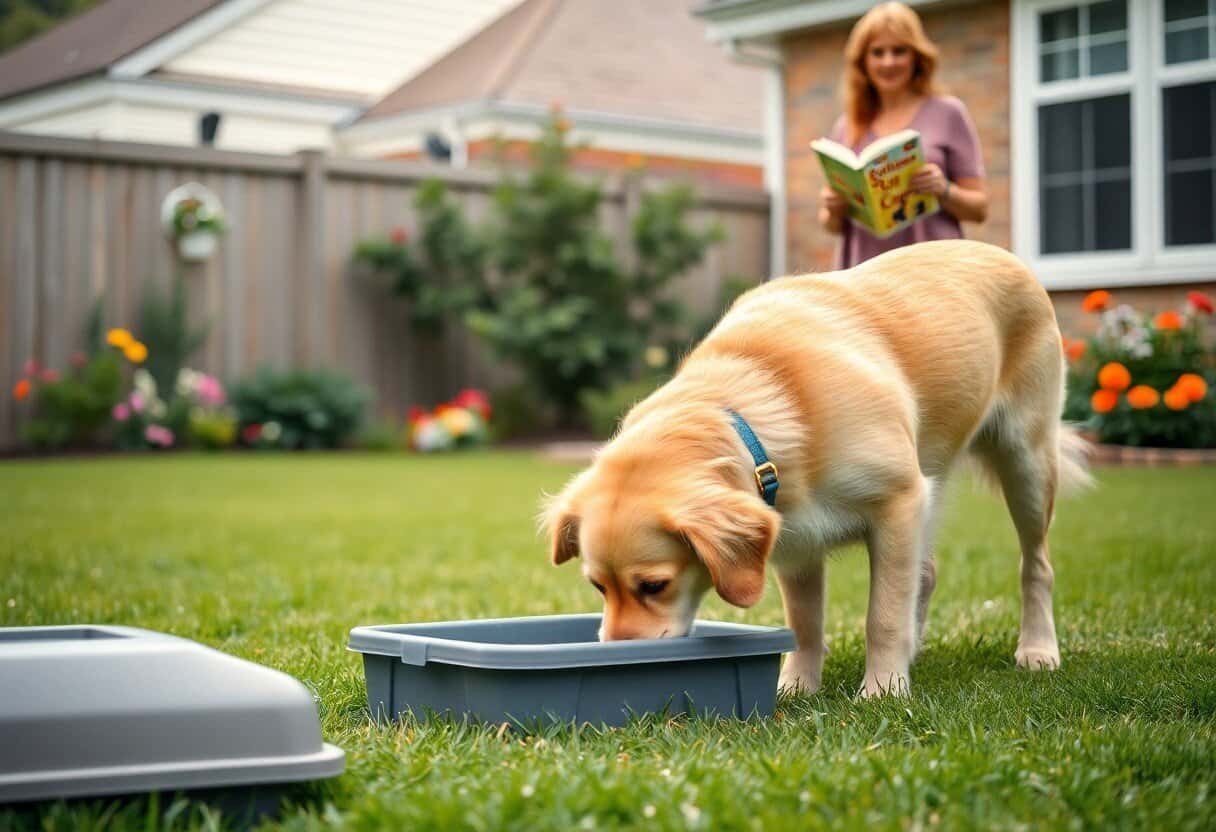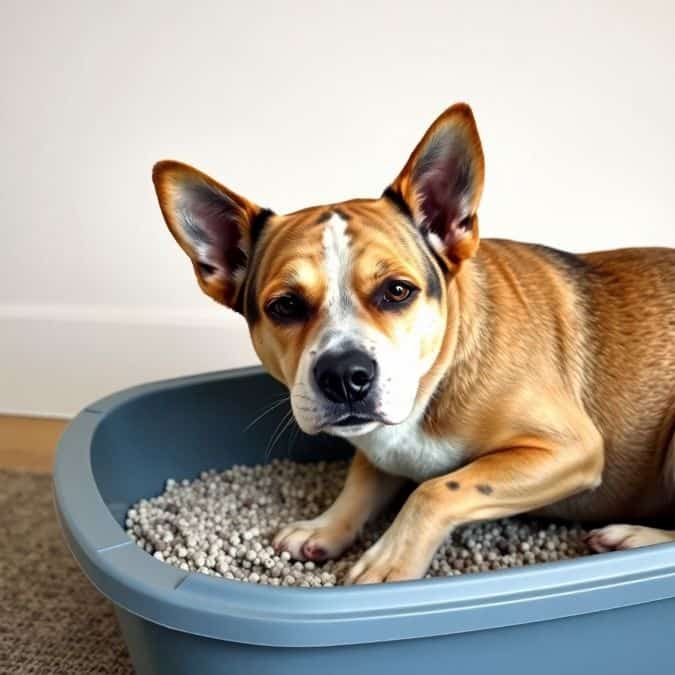Why do dogs eat cat poop? Dogs can be some of the quirkiest companions, and one of their most puzzling behaviors is their tendency to eat cat poop. You might find yourself scratching your head, wondering why your furry friend would indulge in such a smelly snack.
Key Takeaways:
- Dogs are often attracted to cat feces due to its high protein content and appealing scent, which can lead to the behavior known as coprophagia.
- Preventive measures include keeping cat litter boxes out of reach, using deterrent products, and ensuring dogs receive a balanced diet to reduce their desire for cat food and feces.
- Consulting with a veterinarian is important if the behavior persists, as it may indicate underlying health issues or nutritional deficiencies in the dog.
Why Do Dogs Eat Cat Poop?
Dogs are known for their curious nature, and this whimsy often leads them to explore unappetizing treasures, like cat feces. The smell alone is enough to pique their interest. With different dietary habits, the unique aroma of cat poop often captures a dog’s attention and compels them to investigate. As scavengers by nature, dogs are inclined to sample anything that seems out of the ordinary or intriguing, which explains this seemingly bizarre behavior.
Drivers Behind the Behavior
This behavior can be linked to instinctual drives that stem from your dog’s ancestors. Scavenging for food was a survival tactic which has persisted through breeding and domestication. Dogs often evolved to consume a diverse range of items that might provide sustenance, even if it seems unappetizing to us today. Their natural curiosity and scavenger instincts still urge them to seek out whatever might be available, including cat feces.
Nutritional Temptations
What’s fascinating about cat poop is its composition, which can have an alluring scent for dogs. The high protein content in a feline’s diet, especially if they’re eating premium, grain-free kibble, can make their waste particularly appealing. Dogs, being opportunistic feeders, may find the undigested nutrients and fats enticing, leading them to indulge in this peculiar munching habit.
Significantly, cat poop can contain traces of undigested food, and that’s enough to spark your dog’s interest. Cats process their food differently, often resulting in higher protein levels that pass through their digestive systems. This creates an aromatic snack that not only satiates your dog’s curiosity but also provides a small, flavorful boost of nutrients. Such finds can particularly entice dogs who may not be receiving the same levels of protein or variety in their own diet, driving them to seek out the more “delicious” alternatives found in a litter box.
Health Implications of Coprophagia
The act of dogs eating cat poop, known as coprophagia, can raise a variety of health concerns. Beyond being a distasteful habit, this behavior may expose your dog to parasites, harmful bacteria, and other infectious agents. When your dog consumes cat feces, they may inadvertently ingest roundworm eggs or Giardia, both of which can lead to severe gastrointestinal upset. Additionally, nutritional deficiencies in your dog’s diet might contribute to this habit, prompting them to seek out alternative sources of nutrients found in feces.
Potential Risks for Both Dogs and Cats
Coprophagia poses health risks for both your dog and cat. If your dog consumes cat feces, they can contract parasites that could harm their digestive system. Your cat might also be affected if your dog brings those parasites back to them, causing potential health problems. This cycle of exposure increases the chance of illness for both pets, making monitoring their interactions vital in maintaining their well-being.
When Should You Be Concerned?
Pay attention if your dog indulges in coprophagia frequently or shows signs of discomfort. This might include repeated vomiting, diarrhea, weight loss, or lethargy. If your dog develops any of these symptoms after consuming cat poop, a visit to the veterinarian is in order. Regular health check-ups can help ensure your pets remain parasite-free and thriving. Early intervention can lead to better outcomes and prevent potential complications from arising.
Should your dog’s business become more frequent, or their behavior shift to excessive eating of feces, checking in with your vet is advisable. In some cases, this may indicate an underlying health issue, such as malabsorption or enzyme deficiency. Tracking your dog’s eating habits and any changes in their overall demeanor can offer vital information for discussions with your veterinarian, helping them to pinpoint the exact issue and offer solutions tailored to your pet’s needs.

Why Do Dogs Eat Cat Poop? Solutions
Addressing your dog’s troublesome tendency to snack on cat poop requires a combination of environmental management strategies and behavioral modification techniques. By implementing these solutions, you’ll not only protect your pup’s health but also maintain a more harmonious household. Simple adjustments can make a big difference, and being proactive will ultimately lead to success in curbing this behavior.
Keeping Cat Litter Out of Reach
To prevent your dog from accessing cat litter, consider strategically placing the litter box in an area that’s difficult for your dog to reach. Elevating the box on a shelf, using a baby gate, or opting for covered litter boxes can deter curious canines. Additionally, placing the litter box in a separate room and keeping the door closed will create a physical barrier, reducing the chances of your dog indulging in this unappetizing habit.
Behavioral Modification
Training your dog to forgo the temptation of cat feces involves patience and consistency. Positive reinforcement is a powerful tool; reward your dog for ignoring the litter box or recalling them away from it. Use treats, praise, or playtime as incentives. Additionally, teaching your dog commands such as “leave it” or “no” can create a clear distinction between acceptable behaviors and the undesirable act of scavenging cat poop. Engaging in regular activities that redirect their energy, like walking or playtime, can also help reduce their interest in undesirable items.
Incorporating these behavioral modification techniques into your daily routine provides your dog with clear boundaries concerning unwanted scavenging. Consistency is key; practice these commands in various settings and gradually increase distractions. By doing so, you’ll foster a safer environment for both pets, enriching your cat’s territory while promoting positive behaviors in your dog. This patience pays off as your dog learns to respond to cues, significantly reducing their urge to explore feline waste.
Vets Weigh In on Coprophagia
Veterinary professionals often encounter the phenomenon of coprophagia, where dogs indulge in eating feces, including that of cats. Many vets emphasize that while the behavior can be alarming to owners, it is not uncommon. Dogs are scavengers by nature and can display this behavior for various reasons, including nutritional deficiencies, behavioral issues, or simply out of curiosity. Understanding the underlying causes is vital for addressing the behavior effectively.
Common Misconceptions
A widespread misconception is that dogs eat feces due to a lack of proper nutrition or because they are “dirty” animals. In reality, many well-fed dogs engage in coprophagia, driven by instinct, boredom, or learned behavior from puppyhood. Furthermore, some pet owners wrongly believe that certain breeds are more prone to this behavior than others, when in fact, it can occur in any dog regardless of their breed or dietary regimen.
Professional Recommendations
Veterinarians recommend a multifaceted approach to curbing coprophagia. First, ensuring your dog is on a well-balanced diet tailored to their nutritional needs can help reduce the desire to consume feces. Additionally, increasing exercise and mental stimulation can alleviate boredom that might lead to such behaviors. Implementing positive reinforcement training to discourage the habit, combined with immediate cleanup of any pet waste, can significantly minimize your dog’s access to cat feces.
Taking proactive steps can further enhance your efforts. Using deterrent sprays designed for feces can make the taste unappealing, while direct supervision during outdoor time can prevent your dog from indulging in cat waste. If you notice persistent coprophagia, discussing the issue with your veterinarian can uncover any possible health concerns and tailor an action plan suited to your dog’s individual needs. By addressing this behavior thoughtfully, you can help your furry friend maintain a healthy and happy lifestyle, free from the temptation of cat poop.

Dietary Needs and Habits
Understanding your dog’s dietary preferences and nutritional requirements offers insights into their puzzling behaviors, including why they might be tempted to snack on cat poop. Dogs are natural scavengers, often driven by their instincts to explore and consume various food sources. Canine diets are influenced by factors like breed, size, age, and energy levels, which all contribute to the types of food they seek out. Any changes in their diet or behavior can signal an underlying need that requires your attention.
Dog’s Nutritional Requirements
Your dog’s nutritional needs hinge on several aspects, such as their age, weight, and activity level. For adult dogs, a well-balanced diet generally includes high-quality protein, healthy fats, carbohydrates, vitamins, and minerals to support their health. Depending on the breed, larger dogs may require more protein for muscle maintenance, while smaller, more active breeds might benefit from higher caloric intake to sustain their energy levels. Striking the right balance ensures that your dog thrives and decreases the likelihood of them seeking alternative food sources.
Exploring Alternatives
Offering your dog a variety of safe and nutritious treats can effectively curb their interest in cat litter. Engaging toys, regular meal schedules, and healthy snacks made from high-quality ingredients can fill their bellies and give them something positive to focus on. Foods rich in fiber, like pumpkin or carrots, can promote fullness while also acting as a healthy treat option. Additionally, incorporating dedicated playtime can distract your dog from less desirable munchies and enrich their overall experience.
By attending to your dog’s needs with an array of appealing and nutritious options, you’ll likely see a reduction in their inclination to eat cat poop. Consider adding interactive feeders or puzzle toys that dispense treats as they play, transforming mealtime into an engaging experience. You can also mix in wholesome fruits and vegetables to their regular meals, making them more enticing while boosting nutritional value. Keeping your dog occupied and satisfied can limit their scavenging habits, ultimately leading to a happier and healthier companion.
Final Words
Presently, understanding why your dog might be attracted to cat poop can help you manage this behavior effectively. By learning about their instincts, providing proper training, and ensuring a clean environment, you can discourage this unsightly habit. Embrace your curiosity about your canine companion and take the necessary steps to keep them healthy and happy. With the right approach, you can create a harmonious home for both your dogs and cats!
FAQ
Q: Why do dogs eat cat poop?
A: Dogs may eat cat poop for several reasons. One common reason is their natural scavenging instincts; dogs are curious animals and often explore their environment through taste. Cat feces can also contain undigested food and protein that attracts dogs.
Q: Is eating cat poop harmful to dogs?
A: While not all dogs will experience serious health issues from eating cat poop, it can potentially be harmful. Cat feces can contain parasites, bacteria, or toxins that may lead to gastrointestinal upset or infections in dogs.
Q: What can I do to stop my dog from eating cat poop?
A: There are several strategies to deter dogs from eating cat poop. First, ensure that the litter box is placed in an inaccessible area or use a covered litter box that is too tall for your dog to reach. Training your dog with commands such as “leave it” when they approach the litter box can also be effective.


